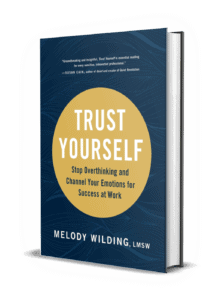No one likes criticism about their work. But being hypersensitive to criticism can feel like a burden you constantly carry.
Whether you’re getting input about how a slide deck could be improved, hearing that leadership isn’t on board with your idea, or otherwise speaking up and putting yourself out there — it can be difficult to separate a person’s response from your own self-worth.
Throughout your career, you’ll always be given feedback in some form or another. Learning to cope with criticism is a key part of professional (and personal) growth, and when processed productively, can actually boost your confidence and be extremely valuable for advancing your career.
That’s not to say, though, that it can’t be extremely uncomfortable or even upsetting: You put your all into your work and take pride in your efforts, so when you’re criticized, it can really sting.
Negative feedback tends to hit Sensitive Strivers especially hard. Because we process everything more deeply, we end up taking people’s opinions personally — seeing it as a failure or indictment on our professional aptitude and capabilities. When we get negative feedback or someone throws a comment our way, we have an intense reaction to it.
Why You’re So Sensitive to Criticism
It’s important to understand that as a Sensitive Striver, you are wired differently.
According to research, about 15 to 20 percent of the population has a genetic trait that leads to a highly calibrated nervous system. This explains why things affect you more profoundly than they might someone else.
Research also shows that Sensitive Strivers have more active mirror neurons, which means you are naturally more perceptive and attuned to your surroundings.
But as a result, you might spend more time monitoring and analyzing other people’s behavior. This vigilance can render you overly preoccupied with external approval and others’ thoughts and opinions, or cause you to read into situations more easily – sending you down an intense emotional spiral.
Nevertheless, thinking deeply is a tremendous strength. That is, as long as you have tools to harness your superpowers effectively.
A Simple Exercise to Deal with Negative Feedback at Work
When on the receiving end of criticism, it’s essential that you separate criticism of the message from criticism of you as the messenger.
It’s important to avoid what authors Sheila Heen and Douglas Stone call “wrong spotting” – where we go on the defensive and fall down an anger spiral that can leave us distracted and depleted.
Besides, there can be a lot of value in criticism especially when it’s delivered constructively. You want to avoid your emotions getting the better of you, and blinding you from all that there is to learn from the person’s comments.
There’s one simple exercise I give my coaching clients that helps them parse helpful feedback from that which can be left behind. It also helps them slow down their own reaction so that they can think clearly and be in control of how they respond to the feedback instead.
Here’s how the exercise works:
STEP 1. TAKE A SHEET OF PAPER AND SPLIT IT INTO FOUR COLUMNS.
It’s best if you do this on hard copy versus a computer, as studies show handwriting is more cathartic. It forces your brain to be more deliberate and also serves as a pattern interrupt (since you likely spend most of your day typing).
STEP 2. IN THE FIRST COLUMN, WRITE DOWN THE EXACT FEEDBACK.
Transcribe what the person said, word for word. Use their exact phrasing and do not layer your interpretation on top of it. Remain as objective and fact-based as possible.
STEP 3. IN THE SECOND COLUMN, LIST EVERYTHING THAT’S WRONG WITH THE FEEDBACK.
This is your chance to let it all out – your anger, frustration, insecurity. Mention inaccuracies, blindspots, and errors in the feedback. Don’t hold back.
STEP 4. IN THE THIRD COLUMN, LIST WHAT MIGHT BE RIGHT ABOUT THE FEEDBACK.
This is where you start your mindset. Begin to broaden your perspective and consider where the other person might be coming from. Are there helpful improvements within the criticism they shared, for example? A new discovery or opportunity? What can you learn or take away from the information they’ve shared with you?
STEP 5. IN THE FOURTH COLUMN, COMMIT TO TAKING ACTION.
Note down your next steps. This may be having a follow-up conversation to clear the air, making a correction, or simply letting it go and moving on with your day.
This exercise provides structure so that you can process feedback in a more balanced way, get back to equilibrium faster, and take constructive steps forward.
Remember, receiving criticism is a fact of life and it can really bring you down if you let it. By having tools to process it you’ll be able to recover more quickly and shine like the competent professional you are.









